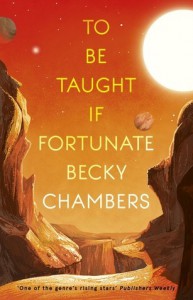Wondrous worlds and some big questions.

This is my first contact with Becky Chambers’s work, and I can’t comment on how it compares with the rest, but I read a review of this novella that intrigued me greatly, and I’m pleased I decided to purchase it and read it. She is a favourite among science-fiction fans, and I can see why.
The description gives a good idea of what the story is about. Ariadne, one of the four members of Lawki 6, a mission part of a programme to explore life outside Earth, with each mission focusing on certain planets that are believed to be able to hold (or develop) some form of life. She is a flight engineer, and each one of the other members of the crew (Elena, Jack, and Chikondi) has their own specialization and their own characteristics. One is a stickler for detail, another one hates early mornings, one is forever listening to music, another one only things about rocks, or plants… They are all young and have spent most of their lives either training or on missions, so although there isn’t much personal information (but there is some) forthcoming, that is not surprising. As the story is narrated in the first person by Ariadne, we hear more from her, but there is enough detail provided to get a sense of how wondrous (but also at time claustrophobic and horrendous) life can be for all of them. And although each one has a different way of coping, they are all tested and survive because they are a team.
I am not a big science-fiction reader and don’t have the knowledge to discuss the ins-and-outs of the science behind the novella, although there is a great deal of research in evidence, which allows readers to understand how things work without overwhelming us with complex explanations. The way the information is delivered reminded me of The Martian, minus the peculiar sense of humour of that novel’s protagonist, and here Ariadne is self-conscious of the fact that what she is explaining might be too much or too little depending on the audience and acknowledges it in her narration. I enjoyed the snippets of science weaved into the story, which I found fascinating, and became even more interested when I read about the author’s sources of information in her acknowledgments. I am not sure hard-core science fiction fans will find this novella up to their standards, but I loved the science part of it as much, if not more, as the fiction. Apart from the science part of the book, the novella also asks some pretty big questions, I’d dare call philosophical, about the nature of knowledge, and what is justified and what is not. Is knowledge for its own sake sufficient? Should everything have a practical application? These are questions humanity has been asking from the beginning of time, and I am not sure we’ll ever get an answer that satisfies everybody.
The writing style combines beautifully descriptive passages (the crew comes across some wonderful landscapes and creatures, and some horrible ones as well), and others where background information is imparted, telling more than showing, although this is fully justified by the premise of the novella, which is a combination of memoir, epistle, and report. There are moments of action, and some when readers are likely to think they know where things are going, but people expecting a standard adventure are bound to be disappointed. This is not a page-turner in the usual sense, and there are many moments of contemplation, wonder, but also of frustration and routine.
The book’s ending is open as it closes with a question, and each reader is free to imagine what comes next. I know what I’d like to happen, but worry that it is unlikely within the premise of the novella. The story proper ends around the 90% mark, as after the acknowledgements there is a sample of another one of the author’s novels, in case readers wonder about its actual length.
I recommend this novella to anybody who enjoys the science bit in science-fiction, and to anybody who likes to imagine and wonder how other worlds might be. It might disappoint those looking for action and adventure, but if you like to let your imagination fly, think, and ask yourself big questions; this novella might be for you. I am sure this won’t be the last of Chamber’s books I read.
 12
12
 6
6







